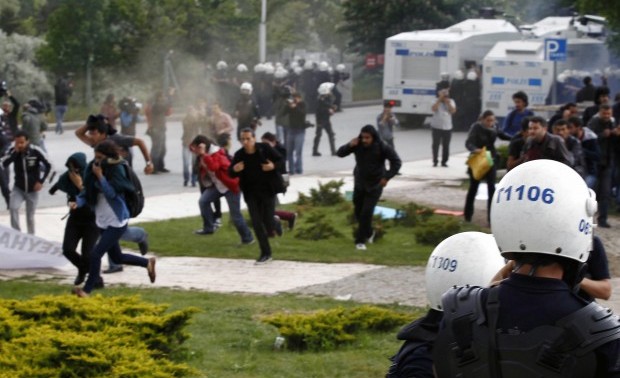
Turkish university students, who were protesting the explosions that killed tens of people in Reyhanlı, near the border with Syria, last week, clashed with riot police at the Middle East Technical University in Ankara, Turkey, Wednesday, May 15, 2013.(AP Photo)
The car bombs that exploded in Reyhanlı on Saturday have galvanized the existing schisms in southeastern Turkish society: between the supporters and the detractors of President Recep Tayyip Erdoğan, between those who back the revolution in neighboring Syria and those who oppose it, and between the myriad sectarian groups that make up this historically multicultural region.
“Erdoğan is following the wrong policy on Syria, and we want him out of power,” said an Antakya local who joined Monday’s demonstration, adding, “the United States is using Turkey to create problems in Syria. We never had problems with Syria before, only when Erdoğan became president.”
American imperialism and criticism of Erdoğan’s relationship with the United States and Europe are common themes at these protests.
A young teacher who joined Saturday’s impromptu demonstration just a few hours after news of the bombing broke said he thought that Erdoğan would use the attack as a pretext to send Turkish troops into Syria: “They will say that Bashar Al-Assad did this and that we have to fight back, but this war was started by the United States and Europe in their own imperial interests.”
But for the Syrian refugees who have settled in this region over the past eighteen months, the protests have a darker and more worrying tone.
One protester said: “We call the Syrians in Turkey the ‘illegal ones.’ They are coming here because they know that Erdoğan will give them money and they will have a better quality of life than they can ever have in Syria.”
The region’s geographical position and Erdoğan’s support for the Syrian opposition are the pull factors that have drawn thousands of refugees to the towns of Hatay province. The people who have settled in the local communities, as opposed to the refugee camps, are—for the most part—middle-class and well-educated. They have taken jobs as translators and humanitarian workers, rented apartments, and started new, albeit unplanned, lives in Turkey.
“Of all the neighboring countries, Turkey has been the best to the Syrians,” says Abdullah, an NGO coordinator who came here from Latakia a year ago. “Here, we can work and live our lives without worrying whether the government will send us back to Syria.”
Hatay is a region with a large native Alawite population that predominately supports the Syrian regime and Bashar Al-Assad. The arrival of the refugees, most of whom are Sunni and supporters of the opposition, has caused latent tensions, but the bombings in Reyhanlı have brought the undercurrents bubbling up to the surface.
“The bombings happened here because the local population is mostly Alawite,” said one protester. “Most of the people here support Assad, and this is the work of the Syrian opposition.”
While the Turkish government has blamed the bombings on the Syrian regime, many locals in Hatay disagree and believe that it is the work of extremists linked to the opposition. The rumors about how and why the attacks happened are rampant.
“This all started because a Syrian ate in a restaurant in Reyhanlı and did not pay the bill,” says one man. “The locals beat him up, and the bombs were planted in revenge.”
Other protesters say that 146 were killed in the attack, not the 46 reported by the media, that only Turks were killed, or that the Syrians in Reyhanlı had prior warning and closed their shops and restaurants before the bombs were detonated. In the heated atmosphere of Hatay a whisper can spread like wildfire, and many angry locals are thirsty for revenge.
“If the government does not kick the terrorists, out then we will kick them out ourselves,” says one angry protester. Another explains how he can spot the Syrian extremists in Antakya “by the way they walk and their beards.”
For Hatay’s Sunni Syrian population, the threat of reprisal feels real and imminent. In Reyhanlı, there were reports of Syrian cars being attacked in the hours after the bombs exploded, and in Antakya a pistol was fired through the window of a Syrian shawarma restaurant. At the Syrian falafel shop opposite, the workers were phlegmatic: “We’re used to shells and bombs, so this is nothing,” said one, a student who has been in Turkey for two months. However, NGOs including Save the Children told their Syrian staff to stay at home on Monday, and many other Syrians in the town are reluctant to leave their houses.
For Erdoğan, much hangs on how he chooses to react to the bombings; they have inflamed divisions in domestic politics as much as they have raised cross border tensions. But in Hatay province, the damage to relations between the Syrian refugees and their Turkish hosts is done, and will take a long time to repair.
“We are expecting more bombings in the towns and villages around here,” said a protester at the end of a third day of demonstrations. “There are more problems to come.”
